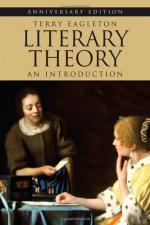
|
| Name: _________________________ | Period: ___________________ |
This quiz consists of 5 multiple choice and 5 short answer questions through Chapter 1, Rise of the English.
Multiple Choice Questions
1. What is the name of the Russian formalist who published the pioneering essay that is the "beginnings of the transformation which has taken over literary theory in this century"?
(a) Leo Tolstoy.
(b) Viktor Shklovsky.
(c) Fyodor Dostoevsky.
(d) Alexander Pushkin.
2. According to Eagleton, in the romantic aesthetic theory the meaning of the word literature became what?
(a) Ideology.
(b) Realism.
(c) Communism.
(d) Psychology.
3. What kind of language does Eagleton say people think of literature as?
(a) Strange.
(b) Difficult.
(c) Ordinary.
(d) Dull.
4. According to Eagleton, what becomes the "panacea for all problems" as part of the romantics' aesthetic theory at the turn of the eighteenth century?
(a) The image.
(b) The text.
(c) The word.
(d) The symbol.
5. For the Romantics, why was their vision of a just society was inverted into a nostalgia for an old and "organic" England?
(a) Because they refused to give up their privilege as writers in industrial society.
(b) Because their vision of a just society was a corrupted version of industrial capitalism.
(c) Because they lacked the means of transforming industrial capitalism.
(d) Because they were revolutionaries who were imprisoned in the old system.
Short Answer Questions
1. For the economist Eagleton discusses, "those economists who dislike theory or claimed to get along better without it" were what?
2. According to Eagleton, as the first industrialist capitalist nation, England becomes what kind of state?
3. According to Eagleton, literature is definable "not according to whether it is fictional or "imaginative," because it uses language in ____ways."
4. According to Eagleton, "properly understood, literary theory is shaped by a ______impulse rather than an _______one."
5. What person is NOT included in the ranks of Russian formalists?
|
This section contains 316 words (approx. 2 pages at 300 words per page) |

|




